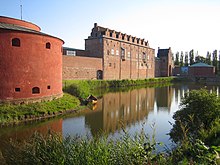Johan Cronman
Johan Cronman | |
|---|---|
 Cronman coat-of-arms | |
| 2nd Governor of Malmöhus County | |
| In office 1727–1737 | |
| Preceded by | Carl Gustaf Hård |
| Succeeded by | Wilhelm Bennet |
| Commandant of Malmö Castle | |
| In office 1727–1737 | |
| Personal details | |
| Born | November 2, 1662 Unanitz, Swedish Ingria |
| Died | July 26, 1737 (aged 74) Malmö, Sweden |
| Resting place | Caroli Church, Malmö |
| Parent(s) | Joakim Cronman (1638–1703) Lunetta Makeléer (1639–1693) |
| Relatives | Fritz Cronman, uncle John Hans Makeléer, grandfather Joachim von Rohr, nephew[1] |
| Military service | |
| Allegiance | |
| Rank | Lieutenant-general |

Johan Cronman (November 2, 1662 – July 26, 1737) was a lieutenant general and the commandant of the Skåne fortress in the Swedish Empire as well as the Governor of Malmöhus County from 1727 to 1737.[2][3] He was Baron of Alatskivi, Kodafer and Kokora; and Master of Vosuauer and Sattkula.
Biography
[edit]He was born on November 2, 1662, in Unanitz, Ingria. He was the son of Joakim Cronman (1638–1703) and Lunetta Makeléer (1639–1693).[4][5][6] Lunetta was the daughter of John Hans Makeléer who was a merchant and banker who had emigrated from Scotland to Sweden. Johan joined the military and was commissioned as a lieutenant with the Narva garrison, and second captain with the Närke and Värmland regiments in 1687. He was promoted to captain with the Zurlauben regiment in 1699, and was made a lieutenant-colonel in 1701. He was promoted to colonel of the Kronoberg Regiment in 1706. On July 11, 1709, he was at surrender at Perevolochna and held prisoner in Siberia until 1722. Johan returned to Sweden after his release and was promoted to lieutenant-general of the infantry in 1722. He was made a baron in 1727, and named the Governor of Malmö and commandant of Malmö Castle, both in 1727. Through his life, he fought in 13 battles, but was never wounded. He spoke 8 languages: Swedish, Latin, German, Estonian, Polish, Russian, French and Dutch.[7] He died on July 26, 1737, at age 75. He had never married or had children.
Legacy
[edit]A plaque at St Petri, Malmö, reads in German:
Ihro Konigl:r Maij:ts Zu Schweden Wolbestalter Generallientenant der Infanterie Landes Hauptman und OberCommendannt der Festungen Zu Schonen Hochwolgebohren Baron H:r Johan Cronman Freijherr Von Alatskivi Kadaster und Kakara Herr Von Vosuauer Sattkula Gebohren Auf Alatskivi 1662 den 2 Novemb. Gelich Gestorben In Malmö den 26 Julii 1737.
It translates into English as:
His Royal Majesty of Sweden recognizes Lieutenant General of the Infantry, Governor and High Commandant at the Fortress of Skåne, Honourable Baron Mr. Johan Cronman, Baron to Alatskivi, Kodafer and Kokora, Master of Wasuva (possibly) and Sottkylä (possibly). Born at Alatskivi November 2, 1662. Died in Malmö on July 26, 1737.
A plaque at Caroli Church in Malmö reads:
Hier ligt der weyland hoch geborne herr baron general lieutenant landshauptmann und ober commandant Johann Cronmann. Freyherr von alt und neu Alatskivi. Herr von Kokara und Sottkyl. Anno 1737
It translates into English as:
Here lies Lieutenant General, Baron, Governor, and Commandant Johan Cronmann. Baron of old and new Alatskivi. Lord of Kokora and Sottkylä. Year 1737
See also
[edit]References
[edit]- ^ August Theodor Låstbom (1843). Swea och Götha höfdinga-minne sedan 1720.
J, dotter af Ofwersten och Commendanten Joachim Cronman. Gift med Charlotta Klingenberg, dotter af Majoren Johan Klingenberg och Elisabeth Wellingks
- ^ Nordensvan, Carl Otto (1904). Värmlands regementes historia.
- ^ von Stiernman, Anders Anton; Rehbinder, Johan Adam; Rothlieb, Carl Fredric; Kröningssvärd, Carl Gustaf (1754). Matrikel öfwer Swea rikes ridderskap.
- ^ Ulla Birgegård (translator and editor) (2002). J.G. Sparwenfeld's diary of a journey to Russia 1684–87. ISBN 91-554-2444-9.
... Johan Cronman (1662–1737). He was born in Ingria and became a lieutenant with the garrison regiment of Narva in December 1683 (Elgenstierna ...
{{cite book}}:|author=has generic name (help) - ^ Joachim Cronman was the son of Hans Detterman Cronman (1590-after 1645), Lord of Alatskivi; and Ursula Kordes (1600–1675). Joachim married Lunetta Makeléer (1639–1693) on August 9, 1657, in Göteborg, Sweden. Lunetta was the daughter of John Hans Makeléer. Joakim Cronman was a colonel at the Narva fortress starting in 1679. He was the Colonel for the Savolaks and Nyslott regiments in 1683. He became the Commandant of Neumünde and died on March 5, 1703.
- ^ His siblings were: Ursula Cronman (1660–1745) who married Christoffer Fredrik von Grothenhielm (1655–1705); Anna Catharina Cronman (c1662-c1685) who married Hans Christoffer von Rohr I (1626–1700) who was killed in action in the Battle of Narva and their son was Joachim von Rohr; and Hedvik Elisabeth Cronman (1663–1699) who married Henrik Aminoff (1653-?)
- ^ Peter Englund (2003). The Battle That Shook Europe: Poltava and the Birth of the Russian Empire. ISBN 9781860648472.
Cronman, Johan 1662–1737, Lieutenant with Narva Garrison 1683, Second-Captain with Närke-Värmland regiment 1687, Captain with Zurlauben's regiment 1699, Lieutenant-Colonel 1701, Colonel of Kronoberg Regiment 1706, captured at Perevolochna, returned 1722, Lieutenant-General of Infantry 1722, Baron 1727, County Governor of Malmohus and Commandant of Skåne Province 1727. Fought in 13 battles, never wounded. Spoke 8 languages: Swedish, Latin, German, Estonian, Polish, Russian, French and Dutch.
Images
[edit]-
Plaque at St Petri, Malmö
-
Plaque at Caroli Church, Malmö
External links
[edit]- 1662 births
- 1737 deaths
- 17th-century Swedish military personnel
- Politicians from Malmö
- Governors of Malmöhus County
- Swedish people of German descent
- Cronman family
- People from Peipsiääre Parish
- Swedish military personnel of the Great Northern War
- Swedish prisoners of war
- 18th-century Swedish military personnel
- Prisoners of war held by Russia
- Swedish Army lieutenant generals
- Age of Liberty people
- People from Scania
- People from Swedish Livonia


